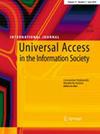Needs analysis for the design of a digital platform to train professionals in online family intervention through live supervision of real cases
IF 2.7
4区 计算机科学
Q3 COMPUTER SCIENCE, CYBERNETICS
引用次数: 0
Abstract
Abstract Purpose Mental health professionals undergo continuous training throughout their careers. Their training consists in part of the supervision of cases by an entire healthcare team, a practice that allows them to consolidate their understanding of behaviour, emotions and to enhance their relationships with patients and their families. The COVID-19 pandemic has had a great impact on this training methodology, leading to a significant increase in the use of digital platforms, but such digital tools are not well adapted to this context, especially when it comes to the supervision of real online cases. The goals of this study are: (1) to analyse what professionals need in order to carry out online interventions and training through the live supervision of real online cases and (2) to create a prototype of a specific digital platform intended to help meet the detected needs. Methods 28 semi-structured interviews were conducted with supervisors ( N = 14) and professionals in training ( N = 14). Results The results have allowed us to gain a deeper understanding of the difficulties and benefits that professionals are encountering when doing online live supervision using the existing video conference platforms. Conclusion This analysis points to a need to create a platform that can overcome the difficulties and enhance the benefits of the digitalization of family intervention training through the live supervision of real cases. These specific needs have yet to be addressed by existing digital platforms.需求分析,设计数字平台,通过对真实案例的现场监督,培训在线家庭干预专业人员
目的心理健康专业人员在其职业生涯中接受持续的培训。他们的培训包括整个医疗团队对病例的部分监督,这种做法使他们能够巩固对行为和情绪的理解,并加强与患者及其家属的关系。COVID-19大流行对这种培训方法产生了很大影响,导致数字平台的使用大幅增加,但这些数字工具并不适应这种情况,特别是在对真实在线病例的监管方面。本研究的目标是:(1)通过对真实在线案例的现场监督,分析专业人员开展在线干预和培训需要什么;(2)创建一个特定数字平台的原型,旨在帮助满足检测到的需求。方法采用半结构式访谈28例,分别对管理人员(N = 14)和在职专业人员(N = 14)进行访谈。结果研究结果使我们对专业人员使用现有视频会议平台进行在线直播监管时遇到的困难和好处有了更深入的了解。本分析指出,需要通过对真实案例的现场监督,创建一个平台,克服家庭干预培训数字化的困难,提升其效益。现有的数字平台尚未满足这些具体需求。
本文章由计算机程序翻译,如有差异,请以英文原文为准。
求助全文
约1分钟内获得全文
求助全文
来源期刊

Universal Access in the Information Society
COMPUTER SCIENCE, CYBERNETICS-
CiteScore
6.10
自引率
16.70%
发文量
81
审稿时长
>12 weeks
期刊介绍:
Universal Access in the Information Society (UAIS) is an international, interdisciplinary refereed journal that solicits original research contributions addressing the accessibility, usability, and, ultimately, acceptability of Information Society Technologies by anyone, anywhere, at anytime, and through any media and device. Universal access refers to the conscious and systematic effort to proactively apply principles, methods and tools of universal design order to develop Information Society Technologies that are accessible and usable by all citizens, including the very young and the elderly and people with different types of disabilities, thus avoiding the need for a posteriori adaptations or specialized design. The journal''s unique focus is on theoretical, methodological, and empirical research, of both technological and non-technological nature, that addresses equitable access and active participation of potentially all citizens in the information society.
 求助内容:
求助内容: 应助结果提醒方式:
应助结果提醒方式:


